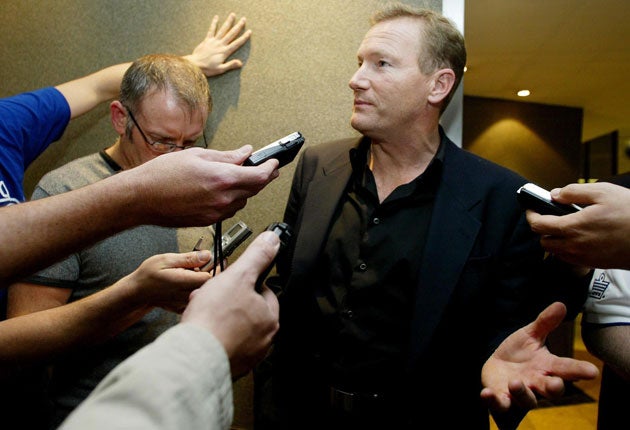Bevan gets to grips with never-ending sack race

The time of year when September runs into October is a brave one for the League Managers' Association to hold its annual conference, for as the days grow shorter, football club chairmen start studying the League tables with increasing concern and managers begin to drop like leaves from the trees. This year's conference at a central London hotel last Thursday was on the theme of "Leading The Team". Before it was over, Leicester City were preparing to announce that Paulo Sousa was no longer leading their team, having been sacked the day after the chairman, Milan Mandaric, offered his backing.
Sousa, who had only been appointed three months earlier, thus became one more case for the LMA's lawyers and one more statistic in a depressing toll. Richard Bevan, who has given the organisation a sharper, more professional edge since joining as chief executive three years ago from the Professional Cricketers' Association, can trot out the figures at the drop of a sack, yet even he struggles to keep up to date. Sousa's brief tenure now means a further decrease in the average period allowed to managers, which was already at an all-time low. Mick McCarthy at Wolves and Tony Pulis at Stoke rank among the top 10 longest-serving in the country simply because they have survived for four seasons; increase that to five years and only half a dozen qualify.
It is Bevan's hope that the number of dismissals is actually levelling out, in part because of his organisation's work in ensuring that clubs are forced to meet their financial liabilities to managers made redundant. He is equally, if not more, concerned about their prospects of being re-employed. "I think it's reached a plateau because of the economic climate and clubs realising that to remove a manager is destabilising but also massively costly," he says. "Much more time and thought is going into the appointments. My concern is to help an out-of-work manager in their professional and private lives to prepare for the next job. At present 49 per cent never get back in. There are people like Kevin Bond [at Tottenham] and Sammy Lee [Liverpool] doing good jobs as coaches rather than managers, but of the balance of the 49 per cent who get an opportunity, 30 per cent never get a third chance. Last season 12 first [time] managers got the sack with an average tenure of just one year."
Initiatives include working with Sport England to help as mentors to young competitors in other sports, especially those hoping to be in contention for the 2012 Olympics. Then there is the whole increasingly complex business of preparing for management in the first place. Last week's conference heard a quote attributed to the chief executive of Sainsbury's that "there's no school for CEOs". The same applies to football managers. The University of Warwick's business school runs a course that several current managers are attending, as Mark Hughes, Stuart Pearce, Aidy Boothroyd and others have done in the past. The LMA has now started an e-course with modules on topics like "Knowing your strengths and weaknesses", "Improving your communication" and "Establishing realistic objectives". Bevan says: "Because everything's about winning you need to define your objectives. Is it to stay in the Premier league, to win a Cup, win the League? And we need to help them understand budgets and the commercial side if they're to survive longer than the 16-month average."
He is particularly passionate about the National Football Centre, now named St George's Park, to where the LMA intends to move if and when it is ever finished; the summer of 2012 is the latest estimate, assuming funding can be completed by the end of this year. "The biggest thing football has ignored is the building and development of the NFC," Bevan says. "That will be the hub. We need to invest in development of young coaches and managers and once that is up we will see within five to seven years a massive difference in development of young players. Then we [the LMA] will be more about training and development than about what a lot of people perceive us as, legal representation for managers when they get the sack." With the words barely out of his mouth, it was time to take up the case of another and issue a strongly worded statement directly criticising the Leicester City chairman.
The LMA makes no distinction in dealing with foreign and domestic managers, though Bevan's conviction about Fabio Capello's successor is clear: "You want the best man for the job but there's a need to move heaven and earth so that once Fabio has completed his time we'll see an English manager. The responsibility for us and the game is to make sure that when the FA board sits down to see how many names they've got, we've helped deliver a pool of names. And improved technical and tactical skills for our young players can only come about with significant investment in our young coaches and managers."
Subscribe to Independent Premium to bookmark this article
Want to bookmark your favourite articles and stories to read or reference later? Start your Independent Premium subscription today.

Join our commenting forum
Join thought-provoking conversations, follow other Independent readers and see their replies